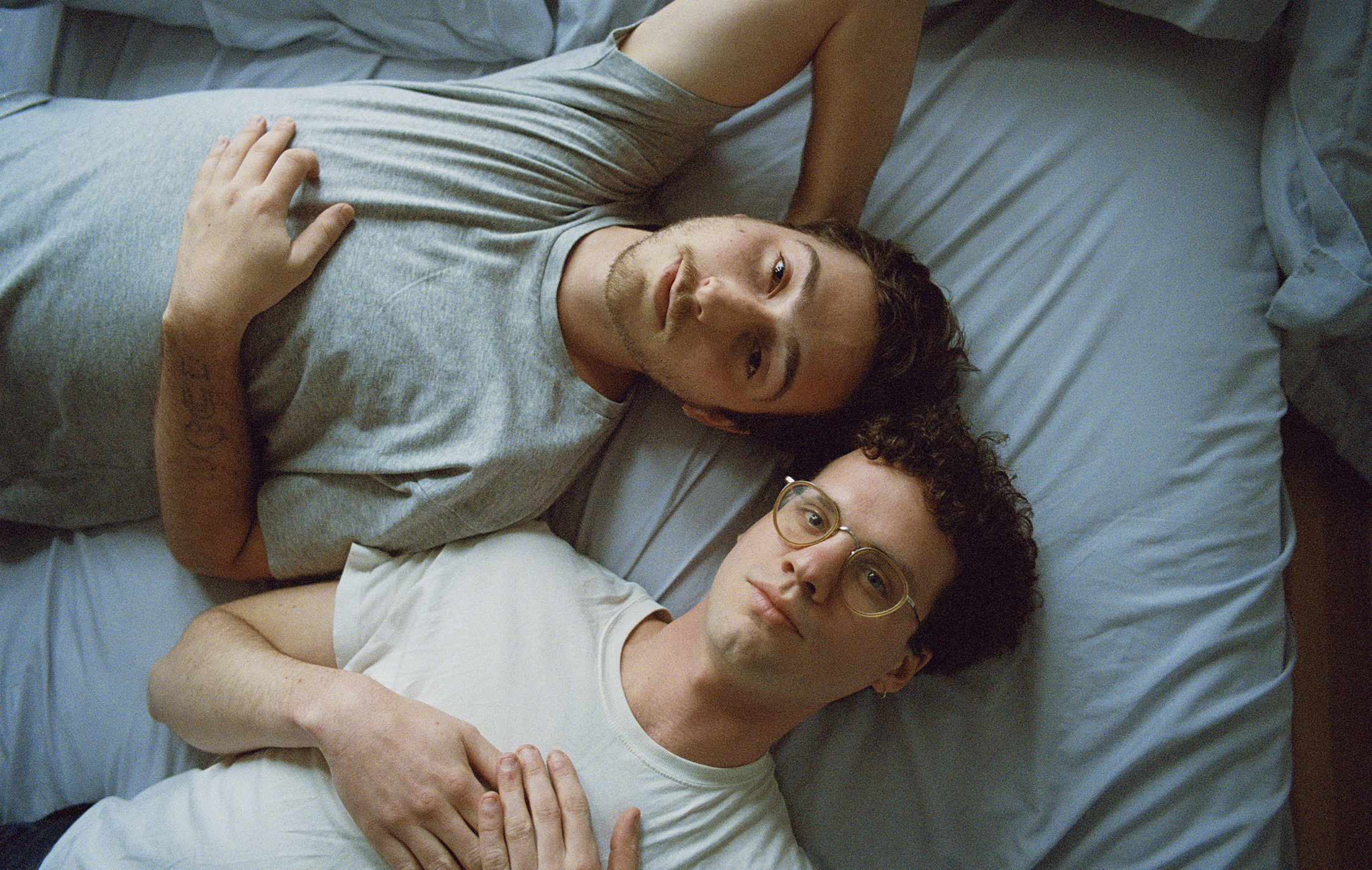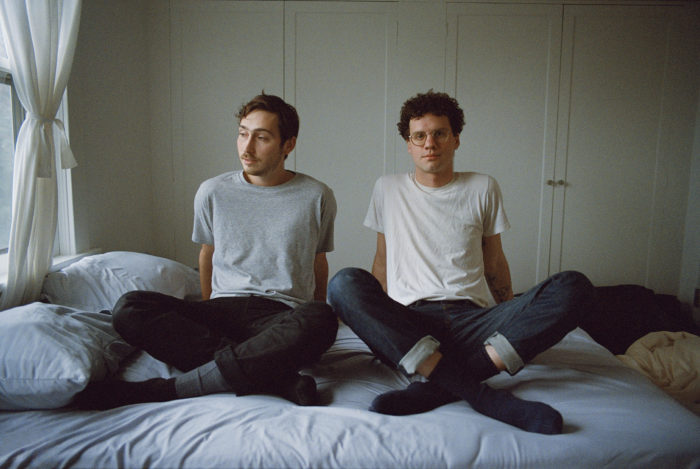Whitney: Straight Into the Storm

photos by Olivia Bee
Whitney turn in a sophomore set full of lonely heartbreak songs so clear and beautiful they’re also universal.
It’s late morning in early July, and Max Kakacek and Julien Ehrlich are weary but wide-eyed. The evening before, they arrived at a rural cabin outside Grand Rapids, Mich., with their whole band in tow for a week of rehearsals. The plan was to show up, unpack and enjoy a restful first night at the Airbnb gem they rented. Instead, the men of Whitney practiced until 5 a.m. To say they’re excited about the upcoming release of Forever Turned Around, the band’s sophomore album, would be an adorable understatement.
“The only day we’ll take off will be July 4, though we’re not feeling very patriotic right now,” says Ehrlich. “But you can get some pretty fun fireworks in this part of the country.”
After finding fast, buzzing success as part of late-2000s, barely-legal indie-rock darlings Smith Westerns, Ehrlich and Kakacek have grown into seemingly wise elders of a world that nearly chewed them up and spit them out. Despite being crafted by two songwriters still in their 20s, Forever Turned Around is a gorgeous, thoughtful, lovelorn pop-rock record that packs in a career’s worth of twists and turns.
Though Smith Westerns have been shrinking in Whitney’s rearview since the latter band began in 2015, the former’s explosion—and then implosion—was critical in informing how Ehrlich and Kakacek wanted to make music. It also meant that the duo had learned what not to do.
With 2011’s breakthrough Dye It Blonde, Smith Westerns became an underground indie phenomenon, with glammed-up guitar riffs and frontman Cullen Omori’s effortlessly cool vocals. Kakacek and Omori were part of the band’s musical core from the begining; Ehrlich joined up after leaving his post as drummer for Unknown Mortal Orchestra. But by 2014, everything just felt off.
“It wasn’t one fight that ended it. It was slow and painful; everyone knew whatever was happening wasn’t healthy,” says Kakacek. “We waited until the tour was over to admit it to ourselves. [Another] album would have been like the next step in a relationship—like committing to moving in together. We thought: We either need to take the next step or just call it off altogether because this is unhealthy for everyone.”
The split made headlines—a band on the rise stopped in its tracks—and Kakacek and Ehrlich, living together in Chicago, took over a year to regroup. They continued to toy with the idea of making music, but not in the present tense.
“We both knew we didn’t want to put that pressure on ourselves again,” remembers Ehrlich. “If anything was going to happen, it had to come out of a place of love, not a place of fear. Us with our backs up against the wall—that’s not how we create the best work.”

For months after Smith Westerns called things off, the two began casually tossing around melodies in their apartment. They sounded good; simple and sweet. Lyrics started to come. They’d self-recorded a half-dozen songs before the thought even arose: “Are we forming a new band?”
“We turned to a few of our friends and said, ‘Hey, do you want to be involved in this?’” says Ehrlich. “Everything was so natural. Some people write one song and declare they’ll be the biggest band ever. But we were just having fun recording, letting it unfold naturally.”
Their demos soon became Whitney’s 2016 debut, Light Upon the Lake, a collection of deliciously simple, country-, folk- and soul-leaning pop songs, with Ehrlich on the drums and falsetto vocals, Kakacek’s shimmering lullaby guitars and a handful of friends stepping in on trumpet, keys and bass. The tune “No Woman” was one of the year’s biggest breakout indie hits: inescapably catchy, breezy and melancholy at once, somehow perfect for both falling in love and breaking up playlists. And that was Whitney’s magic: heartbreaking tunes as sweet as sugar.
The intimate, original demos were released the following year, and Whitney hit the road hard, earning indie-rock royalty status for the second time in a decade along the way. They returned home to Chicago and slowly, naturally, began to write once again.
“We got a little idea in our heads: If the first record was a breakup record, from the vantage point of looking back on the failed relationship, then these new songs would form a marriage record,” says Ehrlich. “You’re immersed, in the eye of the storm, in the ups and downs, but you want to stick it out. It’s a commitment record, acknowledging that change will always play a part in life, but you’re trying to hold it together.”
Those themes—the same that floated Smith Westerns before their inevitable end—paint Forever Turned Around with a bittersweet stroke. The album’s 10 songs are gently filled with longing, uncertainty and resistance to change, brutal emotions softened by gorgeous melodies and soft-swaying grooves, cracking a smile through tears.
“I never want to fade away/ Wanna turn as the seasons change/ And every time you come around/ Well, the days of the year just slow down,” sings Ehrlich on “Valleys (My Love).” Atop the twinkling guitar melody of “Song for Ty,” Ehrlich wonders, “Tell me everything stays the same/ Will we meet again down the way?” before the sun shines through for the chorus: “Anything could happen.”
It could, right? Whitney is proof.
The band culled Forever Turned Around from sessions in various studios, including Justin Vernon’s April Base, with production help from Foxygen’s Jonathan Rado and longtime Justin Vernon collaborator and Megafaun member Brad Cook. It was mixed by Tucker Martine—whose credits include Modest Mouse, My Morning Jacket and The Decemberists. The big names behind the boards added a new layer of faith to these bare, uncomplicated tunes. The album’s sound is undeniably fuller than Light Upon the Lake, flush with strings and horns and organs, and with a twirling, trumpet-led instrumental, “Rhododendron,” at its halfway point.
“These songs are definitely pretty heavy, talking about darker things in life,” says Kakacek. “So we wanted to put a track in to let loose with some stoner goofiness.”
It’s not a major departure from their debut. Rather, it’s a refining of what makes Whitney Whitney—the universality of heartbreak and loneliness, conveyed through melodies so clear and beautiful it’s a wonder they’ve never been uncovered. It is full of songs to cradle a bruised heart in blankets and reassuring whispers; songs that feel warm, and even familiar, on first listen before.
“We know this album is darker, maybe less hopeful than the last. But we still tried to put as much hope in these songs as we could,” says Ehrlich. “I mean, we wrote the record about real relationships. Relationships we are still in. We both go through the ups and downs, but we’re pretty stable.”
This article originally appears in the September 2019 issue of Relix. For more features, interviews, album reviews and more, subscribe here.




















